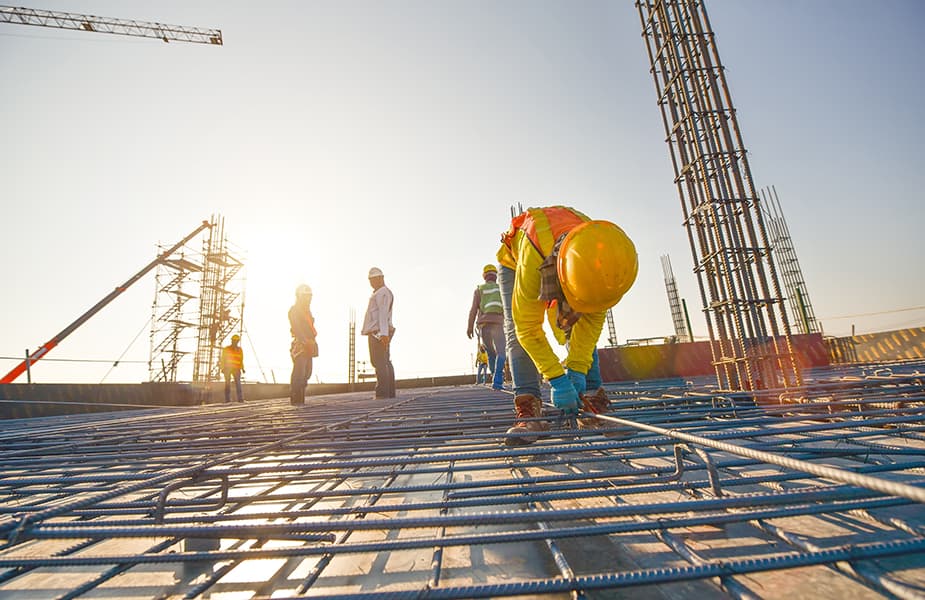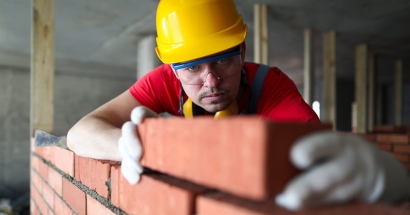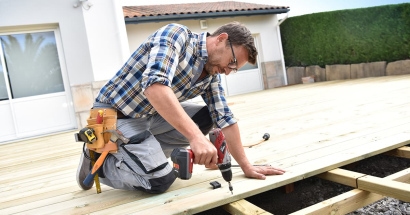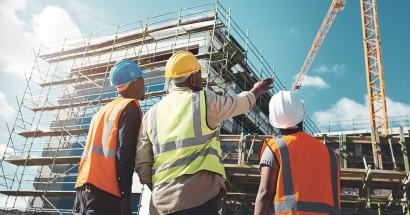
Insurance for Construction in Vancouver
You’re a builder. From new home construction to commercial projects, you can face on-the-job risks.
Protect your British Columbia construction business with the right business insurance.

What kind of construction insurance do I need?
A construction insurance package is a group of coverages that will protect your business. It should include protection against on-the-job risks that you face, such as third-party bodily injury and property damage. You may be asked for proof of insurance with prospective clients and many lenders will require it.
Go over the types of coverages you need in detail with your Western business insurance expert to make sure your British Columbia construction business has the right construction insurance package.
1. Commercial General Liability Insurance: Construction sites can be dangerous places, especially for any visitors. If you were sued, commercial general liability insurance would cover the legal costs to defend the claim against your business in court, as well as costs to cover damages to compensate third parties.
It’s recommended that you should have at least $2 million in coverage, depending on the size of your construction business.
What kind of risks does commercial general liability (CGL) cover?
- Injury to another person who is not your employee
- Damage to someone’s property
- Damage to rented property
- Medical bills if someone is injured
- Legal costs and settlement costs of liability lawsuits filed against you
- Liability lawsuits related to slander and libel
You should also make sure that any subcontractors you work with have liability insurance. Your policy will cover your employees but typically not subcontractors. If a subcontractor damages property at a job, you could be held liable. They should have their own liability insurance, that way if there is an accident it will be covered by their policy.
Tell us about your British Columbia construction business and your Western business insurance expert will get you the commercial liability insurance that you need at the right value for your construction business.
2. Commercial Property Insurance: Whether you rent or own your business location, this type of insurance can provide financial coverage in the case of a fire that destroys or damages your business property and its contents.
Commercial property insurance also protects your place of business or office and its contents from damage or loss related to severe weather, natural disasters, theft, and vandalism.
3. Mobile Property Insurance: If you regularly move equipment across different locations, mobile property insurance provides coverage for property that you don't store at a fixed location, or for equipment routinely taken offsite.
Mobile property insurance covers transit and theft that could happen due to property not being stored in a secure location, as opposed to commercial property insurance that covers property generally expected to be in a designated location.
4. Tools and Equipment Insurance: You need have tools and equipment insurance. This type of insurance provides financial protection for any transportable tools or equipment that your construction business uses to complete their work projects.
Tools and Equipment Insurance can provide reimbursement to repair or replace tools if they are lost, damaged, or stolen. Insured events apply to tools and equipment that are vandalized, stolen, lost, or damaged by fire or flood.
Any item valued at less than $1,500 is considered a tool. Anything valued above $1,500 is considered equipment.
Be sure to have a list of your tools and equipment handy when you speak to your Western business insurance expert for coverage.
5. Course of Construction: Course of Construction Insurance, also known as Builder’s Risk insurance, insures buildings or projects under construction against the costs of repair or replacements in the event natural disasters such as a flood, fire, explosion, theft, or vandalism. It should be considered as essential to your construction business.
Ask your Western business insurance expert about Course of Construction coverage for your construction business.
6. Construction Bonds: Construction bonds are often a requirement of construction business owners for many different types of projects. The need for bonds will be left up to the owner of the job and the level of security they feel comfortable allocating to the construction work being done.
Construction bonds may be required on both public and municipal contracts, as well as private projects and builds.
Some examples of projects that are often bonded include: Commercial and residential developments, road building, road maintenance, street lighting contracts, bridge building, hospitals, prisons, and site servicing for mechanical and electrical works.

What type of bonds can be required?
Surety Bond: When you accept a job, you are obligated to complete it. A surety bond, or contractor bond, will pay your customer if your construction business does not complete a job. You can obtain a surety bond for a specified amount from your Western insurance business expert.
Bid Bond: A bid bond is a financial instrument that’s used as a proof of commitment for a you as a construction business owner to submit a tender price for a specified project. These are typically provided in the amount of ten percent (10%), but can also be a specified dollar amount ($) or other percentage.
Performance Bond: It guarantees the performance of construction works outlined in a contract that has been awarded to a contractor. These bonds are conventionally in the amount of fifty percent (50%), but can be up to 100% of the contract price.
Labour and Material Payment Bond: It’s a document that provides security for your construction business’s sub-contractors and suppliers in the event that you are unable to pay them. It’s usually 50% of contract value requirements but can be issued for up to 100%.
Construction Bonds: Construction bonds are often a requirement of construction business owners for many different types of projects. The need for bonds will be left up to the owner of the job and the level of security they feel comfortable allocating to the construction work being done.
Construction bonds may be required on both public and municipal contracts, as well as private projects and builds.
Some examples of projects that are often bonded include: Commercial and residential developments, road building, road maintenance, street lighting contracts, bridge building, hospitals, prisons, and site servicing for mechanical and electrical works.

What is course of construction?
Course of Construction Insurance, also known as Builder’s Risk insurance, insures buildings or projects under construction against the costs of repair or replacements in the event natural disasters such as a flood, fire, explosion, theft, or vandalism. It should be considered as essential to your construction business.
Ask your Western business insurance expert about Course of Construction coverage for your construction business.

How much construction insurance do I need and how much will it cost?
How much construction insurance you need and how much it will cost will depend on the size of your firm and the work that you do.
That means it’s unlikely that all construction businesses would pay the same monthly or annually for their coverage.
The cost will depend on factors such as:
- The type of construction
- Location
- Number of employees
- Annual revenue
- Any past claims
- Security measures
What kind of risks does commercial general liability (CGL) cover?
- Injury to another person who is not your employee
- Damage to someone’s property
- Damage to rented property
- Medical bills if someone is injured
- Legal costs and settlement costs of liability lawsuits filed against you
- Liability lawsuits related to slander and libel
Need your Certificate of Insurance (COI) fast?
Some projects may require you to provide a certificate of insurance (COI). A certificate of insurance is issued by an insurance broker or company, and it shows that you have business
insurance. It is a summary or snapshot of your insurance policy, and it contains all the most important details, helping protect against third-party risk. Customers, businesses, or
independent contractors could ask to see proof of insurance before they agree to work with you. If the work you do has a high risk of loss or damage, you should have a certificate of
insurance.
When you get your insurance coverage through us, we will send you the certificate of insurance right away, so you can focus on what you do best.
Insurance for Bricklayers
Your job as a bricklayer or stone mason means lifting and long periods of standing, kneeling, and bending. It can involve dangers and injuries. You’ll need specialized masonry insurance to protect you.
If you are an independent contractor or you have a bricklaying or stone masonry business, you’ll need the right insurance whether you’re laying or repairing brick work, reinforcing a retaining wall, or laying a patio.
Insurance for Deck Contractors
Vancouver deck and fence contractors need liability insurance to protect themselves against injuries and mishaps involving clients and suppliers and for any damage to their property.
Should there be a lawsuit against you and you are held legally responsible and do not have deck and fence liability insurance as a Vancouver contractor, you would be responsible for paying the costs out of your pocket.
Course of Construction Insurance
What happens if there’s vandalism or a fire at your construction site? Course of construction insurance protects you as a Vancouver contractor when you’re building a commercial, residential, or industrial building project.
You’ll also hear it called builders risk insurance and it’s the same thing. This type of insurance for Vancouver contractors ensures that your project is protected during the construction phase. Course of construction insurance should be considered as essential for your Vancouver construction business.





